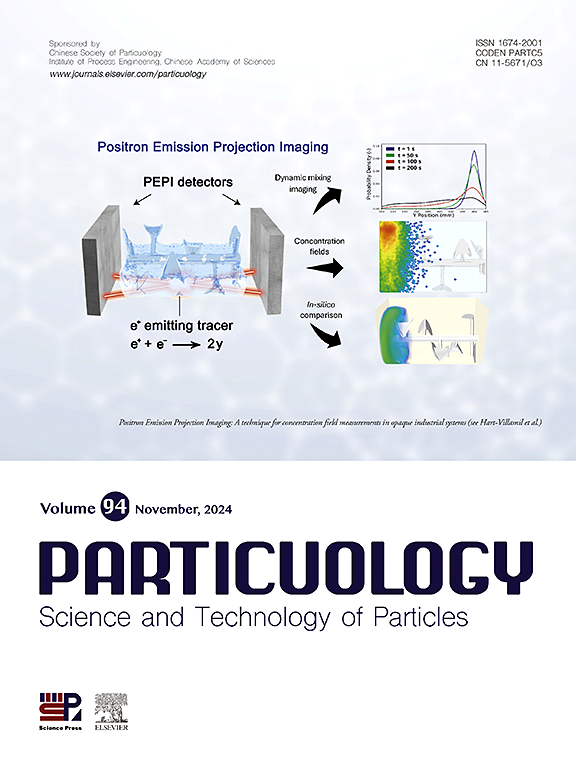海藻酸盐包封对活性药物成分离子液体盐包封明胶口服微丸质量特性及贮存稳定性的影响
IF 4.3
2区 材料科学
Q2 ENGINEERING, CHEMICAL
引用次数: 0
摘要
活性药物成分(API)的离子液体(IL)盐消除了与传统API盐相关的多态性,是一种很有前途的难溶性原料药配方。作为高粘性液体,api - il的口服剂量配方具有挑战性,需要将其固定在颗粒载体上,通常是通过喷雾干燥。本研究通过将api - il掺入软性明胶-海藻酸盐微球中,开发了一种替代的口服剂量配方,其中海藻酸盐的作用是提高吸湿性和热敏性明胶的储存稳定性。以难溶性布洛芬(IBU)和1-丁基-3-甲基咪唑(BMIM)作为模型API-IL。研究了不同明胶与海藻酸盐比例下海藻酸盐包合对ibu - bmi负载微球质量属性的影响。评估的属性包括物理外观、IBU- bmim有效载荷、剂量均匀性、流动性、IBU- bmim释放和IBU溶解度增强。结果表明,IBU-BMIM在掺入球团后仍保持其液体状无定形,从而保留了其溶解性增强能力,尽管由于海藻酸盐包合后IBU-BMIM释放较慢,其溶解性增强程度较低。藻酸盐包合物也影响了微球的物理外观、厚度、流动性和明胶的二级结构,而对有效载荷和剂量均匀性的影响最小。重要的是,颗粒在加速储存(40°C和75%相对湿度)一个月后保持稳定,其质量属性变化最小。本文章由计算机程序翻译,如有差异,请以英文原文为准。

Effects of alginate inclusion on quality attributes and storage stability of gelatin oral pellets encapsulating ionic liquid salt of active pharmaceutical ingredient
Ionic liquid (IL) salts of active pharmaceutical ingredients (API) represent promising formulations for poorly-soluble APIs as they eliminate polymorphism commonly associated with conventional API salts. Being highly viscous liquid, oral dosage formulation of API-ILs is challenging, necessitating immobilization onto particulate carriers, typically by spray-drying. This study developed an alternative oral dosage formulation of API-ILs by incorporating them into soft gelatin-alginate pellets, where the alginate’s role was to improve storage stability of hygroscopic and thermally-sensitive gelatin. Poorly-soluble ibuprofen (IBU) and 1-butyl-3-methylimidazolium (BMIM) was used as the model API-IL. The impacts of alginate inclusion at varying gelatin-to-alginate ratios on quality attributes of IBU-BMIM-loaded pellets were investigated. The evaluated attributes included physical appearance, IBU-BMIM payload, dosage uniformity, flowability, IBU-BMIM release, and IBU solubility enhancement. The results showed IBU-BMIM remained in its liquid-like amorphous form upon incorporation into the pellets, thereby preserving its solubility enhancement capability, albeit at a lower degree due to slower IBU-BMIM release upon alginate inclusion. Alginate inclusion also influenced the pellets’ physical appearance, thickness, flowability, and gelatin’s secondary structures, while having minimal impacts on payload and dosage uniformity. Importantly, the pellets remained stable after one-month of accelerated storage (40 °C and 75 % relative humidity) with minimal variations in their quality attributes.
求助全文
通过发布文献求助,成功后即可免费获取论文全文。
去求助
来源期刊

Particuology
工程技术-材料科学:综合
CiteScore
6.70
自引率
2.90%
发文量
1730
审稿时长
32 days
期刊介绍:
The word ‘particuology’ was coined to parallel the discipline for the science and technology of particles.
Particuology is an interdisciplinary journal that publishes frontier research articles and critical reviews on the discovery, formulation and engineering of particulate materials, processes and systems. It especially welcomes contributions utilising advanced theoretical, modelling and measurement methods to enable the discovery and creation of new particulate materials, and the manufacturing of functional particulate-based products, such as sensors.
Papers are handled by Thematic Editors who oversee contributions from specific subject fields. These fields are classified into: Particle Synthesis and Modification; Particle Characterization and Measurement; Granular Systems and Bulk Solids Technology; Fluidization and Particle-Fluid Systems; Aerosols; and Applications of Particle Technology.
Key topics concerning the creation and processing of particulates include:
-Modelling and simulation of particle formation, collective behaviour of particles and systems for particle production over a broad spectrum of length scales
-Mining of experimental data for particle synthesis and surface properties to facilitate the creation of new materials and processes
-Particle design and preparation including controlled response and sensing functionalities in formation, delivery systems and biological systems, etc.
-Experimental and computational methods for visualization and analysis of particulate system.
These topics are broadly relevant to the production of materials, pharmaceuticals and food, and to the conversion of energy resources to fuels and protection of the environment.
 求助内容:
求助内容: 应助结果提醒方式:
应助结果提醒方式:


